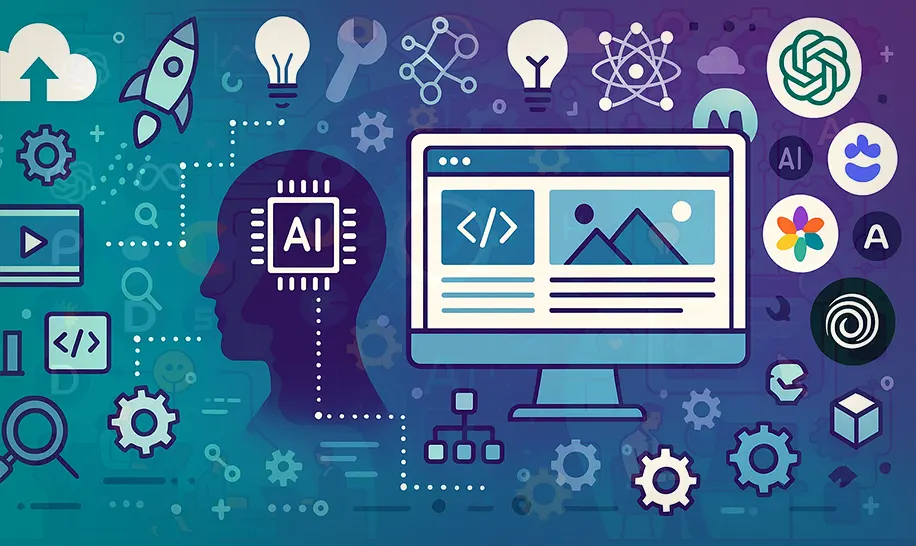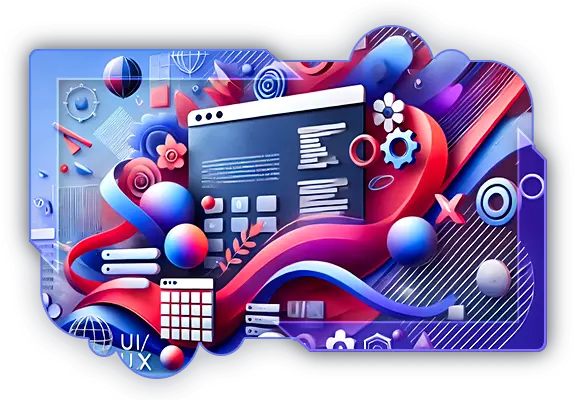
How AI Can Revolutionize the World of Website Development?
AI is fundamentally reshaping website development, automating tedious tasks, enabling hyper-personalization, and accelerating development cycles, which presents both immense opportunities for those who adapt and significant risks for developers who ignore this technological shift.
How AI Can Revolutionize the World of Website Development
The digital landscape is in a constant state of flux, and at the forefront of its latest transformation is Artificial Intelligence (AI). No longer a futuristic buzzword, AI is actively reshaping industries, and website development is no exception. From the way we conceive design to the intricacies of coding and user experience, AI is introducing a paradigm shift. This revolution brings forth a wave of benefits, streamlining processes and unlocking new potentials. However, it also serves as a stark warning to developers: adapt to the AI-powered future, or risk being left behind.
This comprehensive guide explores the multifaceted ways AI is revolutionizing website development, the tangible benefits it offers, and a crucial message for developers navigating this evolving terrain.
The AI Tsunami: How Artificial Intelligence is Redefining Web Development
AI's integration into website development isn't about replacing human developers; it's about augmenting their capabilities and automating aspects of the workflow that were once time-consuming and labor-intensive. This allows developers to focus on more complex, creative, and strategic tasks.
Key Areas of AI Impact:
- AI-Powered Design and User Experience (UX):
- Intelligent Design Assistants: AI tools can analyze vast datasets of design trends, user behavior, and A/B test results to suggest optimal layouts, color schemes, and typography. Tools like Uizard can even convert hand-drawn sketches or mockups into functional code or design prototypes in minutes.
- Personalized User Interfaces: AI algorithms can tailor website experiences in real-time based on individual user data, preferences, and past interactions. This means dynamic content, personalized recommendations, and adaptive interfaces that cater to each visitor uniquely, significantly boosting engagement and conversion rates. Think of Netflix's recommendation engine, but applied to website layouts and content.
- Accessibility Enhancements: AI can help identify and suggest improvements for website accessibility, ensuring sites are usable by people with disabilities by analyzing code and content against accessibility standards (WCAG). This includes generating alt text for images or ensuring proper color contrast.
- Accelerated Development with AI Coding Assistants:
- Automated Code Generation: AI-powered coding assistants like GitHub Copilot and Tabnine provide intelligent code suggestions, auto-complete functions, and can even generate entire code snippets based on natural language prompts. This dramatically speeds up the coding process and reduces the likelihood of syntax errors.
- Bug Detection and Debugging: AI algorithms can analyze code to identify potential bugs, security vulnerabilities, and performance bottlenecks far more efficiently than manual reviews. Some tools can even suggest or automatically apply fixes.
- No-Code/Low-Code Platforms on Steroids: While no-code/low-code platforms have been around, AI supercharges them. AI-driven website builders like Wix ADI or 10Web AI Builder can create entire, customized websites based on a few user prompts, handling much of the initial design and setup.
- Smarter Testing and Maintenance:
- Automated Testing: AI can automate various testing phases, including functional testing, visual regression testing (ensuring UI consistency across updates), and even usability testing by simulating user interactions and identifying pain points. Tools like Applitools use visual AI for this.
- Predictive Maintenance: AI can monitor website performance and predict potential issues before they impact users, such as identifying when server resources might be strained or when a particular component is likely to fail.
- Automated Content Updates and Management: For content-heavy sites, AI can assist in tagging content, optimizing it for SEO, and even generating routine content updates or summaries.
- Enhanced SEO and Content Optimization:
- AI-Driven SEO Analysis: AI tools can perform in-depth SEO audits, identify relevant keywords, analyze competitor strategies, and suggest on-page optimizations to improve search engine rankings.
- Personalized Content Delivery: As mentioned with UX, AI can ensure that the right content reaches the right user segment at the right time, improving engagement and SEO through better user signals.
- AI-Generated Content: While human oversight is crucial, AI can assist in generating initial drafts for blog posts, product descriptions, or ad copy, saving significant time. Hostinger's AI writing tool is an example.
- Improved Website Security:
- Threat Detection and Prevention: AI systems can monitor website traffic for anomalous behavior, identify potential security threats like malware or DDoS attacks in real-time, and even initiate defensive measures.
- Vulnerability Scanning: AI can proactively scan code and dependencies for known vulnerabilities, helping developers patch them before they can be exploited. Snyk is a tool that offers such capabilities.
The Benefits: Why Embracing AI is a Game-Changer for the Development World
The integration of AI into website development isn't just about new tools; it's about tangible benefits that impact efficiency, quality, and the bottom line.
- Increased Efficiency and Speed: This is perhaps the most significant advantage. By automating repetitive tasks like code generation, testing, and even initial design mockups, AI drastically reduces development timelines. Projects that once took months can now be prototyped or even launched in weeks or days.
- Enhanced Productivity: With AI handling mundane tasks, developers can focus their expertise on higher-level problem-solving, innovation, and creating unique user experiences. This leads to more fulfilling work and greater output.
- Improved Code Quality and Reduced Errors: AI-powered bug detection and code analysis tools help catch errors early in the development cycle, leading to more robust and reliable websites. Code assistants also promote best practices and consistency.
- Hyper-Personalization at Scale: AI enables businesses to deliver tailored experiences to vast numbers of users simultaneously, something that was previously unfeasible. This level of personalization leads to higher customer satisfaction, loyalty, and conversion rates.
- Data-Driven Decision Making: AI provides powerful analytics and insights into user behavior, design effectiveness, and website performance. This allows developers and businesses to make informed decisions based on data rather than guesswork.
- Cost Reduction: While there might be initial investment in AI tools, the long-term savings from increased efficiency, reduced development time, fewer errors, and optimized resource allocation can be substantial.
- Better User Engagement and Experience: Ultimately, AI helps in creating websites that are more intuitive, responsive, personalized, and engaging, leading to a superior overall user experience.
- Keeping Up with Innovation: AI allows development teams to experiment and implement cutting-edge features more easily, keeping their web products modern and competitive.
A Word of Warning: The Perils of Ignoring AI for New Developers
For new developers entering the field, the rise of AI presents both an exciting opportunity and a critical challenge. Ignoring the AI revolution is not an option if you aim for a sustainable and successful career in website development.
- Becoming Obsolete Faster: The skills that are highly manual today are the first ones AI will automate or significantly assist with. Developers who rely solely on traditional, manual coding for tasks that AI can do faster and more efficiently will find their skillset devalued.
- Reduced Competitiveness: Employers and clients will increasingly seek developers who are proficient in using AI tools to enhance their workflow. Those unfamiliar with AI-driven development will be at a significant disadvantage in the job market. Projects might be awarded to teams that can deliver faster and more cost-effectively using AI.
- Inability to Leverage Advanced Capabilities: AI unlocks new possibilities in areas like advanced personalization, predictive analytics, and intelligent automation. Developers not versed in AI will be unable to implement these sophisticated features, limiting the quality and innovation of their work.
- Slower Workflow and Lower Productivity: While peers are leveraging AI to accelerate their development process, debug code faster, and automate testing, those who don't will lag behind in terms of speed and productivity. This can impact project deadlines and overall performance.
- Missing Out on Creative Freedom: Ironically, by not embracing AI to handle repetitive tasks, developers might find themselves with less time and mental bandwidth for the truly creative and strategic aspects of web development where human ingenuity shines.
- The "AI Divide": A gap is emerging between developers who are AI-literate and those who are not. To stay relevant, continuous learning and adaptation are crucial. This includes understanding how to prompt AI tools effectively, critically evaluate their output, and integrate them seamlessly into the development lifecycle.
It's not about AI replacing developers, but developers who use AI replacing those who don't. The future of web development is a collaborative one, where human creativity and strategic thinking are augmented by the power and efficiency of Artificial Intelligence. New developers should proactively seek to understand and incorporate AI tools and techniques into their skill set. This means:
- Learning to use AI coding assistants.
- Understanding AI-driven design principles.
- Familiarizing themselves with AI-powered testing and analytics tools.
- Focusing on skills that AI complements rather than replaces, such as complex problem-solving, critical thinking, client communication, and strategic UX design.
The Future is Now: Navigating the AI-Powered Web Development Landscape
AI is not a fleeting trend; it's a foundational technology that is fundamentally altering the way websites are built, experienced, and maintained. The revolution is already underway. For businesses, this means opportunities to create more engaging, efficient, and personalized online presences. For developers, it signifies a shift in focus towards higher-value tasks, continuous learning, and embracing AI as a powerful collaborator.
The benefits are clear: faster development cycles, enhanced user experiences, improved code quality, and data-driven insights. The warning to those slow to adapt is equally clear: evolve or risk obsolescence. The world of website development is becoming smarter, faster, and more intuitive, thanks to AI. The developers who thrive will be those who harness its power to build the next generation of digital experiences.



